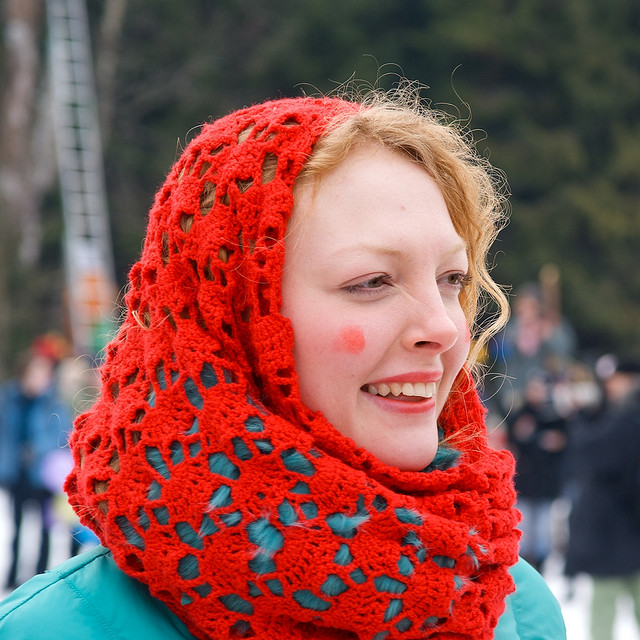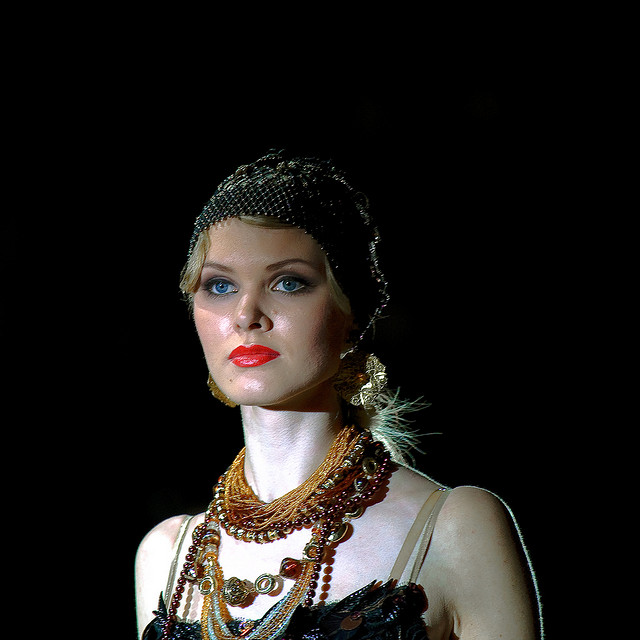
Traditional dress of Russia is a truly a symbol of ethnic diversity in the Russian Federation and it is particularly known in the world for its natural conformity and luminous style. Image by Stas Porter
The Russian Federation, commonly known as Russia is the largest country of the lovely planet in terms of territorial expansion. According to the historians, Russia was firstly inhabited by the East Slavs and other nomadic pastoralists. After this, there is a long history of the arrivals of different groups, nations and invaders. Today’s Russia is home to more than 150 million people and its half of the population is considered ethnically pure Russians.

The ethnical diversity is much reflected in the colors and kinds of the traditional dress of Russia. Russian traditional outfits are enriched with splendid arrangements and decorative motifs. Red color is the most popular in the clothing heritage of Russia.

A kosovorotka is a traditional Russian shirt for a man which is actually a long sleeved garment which reaches down to the mid-thigh. Kosovorotka is normally having no buttons downwards but having several buttons at the collar (unfastened when the garment is pulled over the wearer’s head), though these are positioned off to one side (regional styles vary between left and right), instead of centrally, as is customary with a typical Western 20th and 21st century man’s shirt. If left unbuttoned the collar appears skewed, which accounts for the garment’s name. The collar and sleeves of kosovorotka were often decorated with a traditional Slavic ornament.

Rubashka is long attire originally made with home-spun linen which is in the use of both the Russian men and Russian women for hundreds of years. Now the same is worn in various styles and decorations. Although we don’t find a perfect example for the traditional dress for peasant in Russia, yet Rubashka somehow represents the rural population of Russia. Men also wore a rubashka either with a belt outside of their pants or tucked into their pants.

The traditional Russian kaftan is little bit different from usual Mesopotamian kaftans and it was usually worn by the most conservative sect of religious believers. It is a long suit with tight sleeves which by the 19th century, became the most widely spread type of outer clothing among peasants and merchants.

Russian women love to wear bright colored and delicately designed outfits to prepare themselves for traditional appearances in ceremonies, weddings and folk events. Many Russian women have skillful crafting art of sewing such dresses and the art is normally transferred to them via inheritance. Traditional dresses for women in Russia are not so complicated and over-whelmed in their patterns and designs as they are useful for the casual wearing also.

Russian women make their blouses very charming and embellished. Usually their blouses are adorned with embroidery work and beads. They normally select cotton fabric and decorate them with symmetric stylized pattern or embroidery. This is their centuries old tradition and such ancient folk motifs are still in fashion today.

A sarafan is a long, trapeze-shaped traditional Russian jumper dress for ladies which is usually worn by the Russian women in the cultural festivities as worn as the Russian folk costume. Sarafans could be of single piece construction with thin shoulder straps over which a sleeveless vest, called a “dushegreya” is sometimes worn, giving the shape of the body of a smaller triangle over a larger one.

For the last 2 or 3 centuries, another thing in the traditional dress for women in Russia has become common and i-e the women’s headdress. It was a strict regulation in the gone days Russia for women of every age to cover their heads. Maiden girls were also bound to at least cover the top of their hair. This was the reason that headdresses became integral part of the traditional outfits in Russia.

Kokoshnik is the best example which normally has a high front shaped like a crescent with rounded edges and it is usually decorated with gold and ornamental embroidery.

As you all know that Russia is a cold country having harsh weather conditions in winter. Russian fur hats are particularly known in the world and that are in the use of the Russians for unknown period. These fur hats usefully protect the Russians even in the coldest environment. Russian fur hats are normally made with soft sheepskin and fluffy rabbit fur and come in different varieties, shapes, colors and sizes.

One thing is perhaps the most significant in the Russian clothing culture; the traditional valenki shoes that are usually made with felt (100 % sheep wool). These boots are still so popular in Russia and now the shoe-makers have brought numerous changes in the styles and designs of valenki shoes. Each valenok is cut out of a single, seamless strip of lamb’s wool. It is dipped in acid and then in boiling water, then before being oven-dried, it is beaten to form a heel and a point at the toe. Valenki felt boots have healing effect – for flu, rheumatic disease, feet massage.

If we don’t mention the traditional shawls of Russia over here, it will be entirely unfair. Pavlovsky Posad is a town in Russia which is still famous for its production of traditional shawls and kerchiefs. These traditional Russian shawls, are prepared with pure and 100 percent soft wool fiber. Now these shawls are made in magnificent patterns with elaborative styles and bright colors.

The shawl-makers engrave and preserve the original designs in wooden blocks, each pattern at a time, and then they print each color separately and make shawls absolutely fancy.

Russian traditional jewelry is also famous in the world, particularly in the northern Europe for its tremendous art-work, phenomenal designs and spectacular patterns. It is elaborated in brilliant manners and comes in different exotic varieties.

Rostov Finift is a traditional Russian handcrafted ornament dating back to 1175 which was at that time made with a type of enamel. It is considered that it was originated in the ancient Byzantium era but after that it became popular in Russia.

Traditional dress of Russia is a truly a symbol of ethnic diversity in the Russian Federation and it is particularly known in the world for its natural conformity and luminous style. Although there are countless regions in the country and each of them has its own clothing identity, yet symmetrical composition of the dress prepared with the graceful fabric is the most common feature among them all.

For more interesting posts with the same subject on the Lovely Planet Website, please click the following links;
1- Algerian Traditional Dress 2- Traditional Dress Of Serbia 3- Traditional Dress Of Kosovo 4- Traditional Dress Of Libya 5- Traditional Dress Of Morocco 6- Traditional Dress Of Albania 7- Traditional Dress Of Tunisia 8- Traditional Dress Of Lebanon 9- Traditional Dress Of Bosnia And Herzegovina 10- Traditional Dress Of Azerbaijan 11- Traditional Dress Of Turkmenistan 12- Traditional Dress Of Kazakhstan 13- Traditional Dress Of Kyrgyzstan 14- Traditional Dress Of Uzbekistan 15- Traditional Dress Of Tajikistan 16- The Traditional Dress Of Laos 17- The Traditional Dress Of Vietnam 18- Traditional Dresses Of The World – 1 19- Traditional Dress Of Jammu & Kashmir 20- Ottoman Dresses From Turkey 21- Colors Of Cholistan 22- Cultural Dresses Of Balochistan 23- Lehenga Choli Or Ghagra Choli 24- Sari Or Saree : Traditional Dress Of Women In South Asia 25- Ajrak , The Traditional Attire From Sindh , Pakistan 26- The Traditional Tais Of East Timor 27- Shalwar Kameez: The Popular Dress Of South Asia 28- Churidar Pajama: The Favorite South Asian Attire 29- Pakistani Bridal Dress 30- Rilli, Sindhi Quilt Art 31- Fantastic, Alluring Khussa Shoes 32- Customs And Traditions Of Kalash Tribe 33- Hanfu, The Classical Chinese Dress 34- London Fashion Week 35- Fashion Week Milan: The Glamorous Event Of Italy 36- New York Fashion Week 37- Paris Fashion Week 38- Traditional Dress Of Jordan 39- Traditional Dress Of Syria 40- Traditional Dress Of Afghanistan 41- Traditional Dress Of Palestine 42- Traditional Dress Of Oman 43-Traditional Dress Of Nigeria 44- Traditional Dress Of Hungary 45-Traditional Dress Of Ukraine 46- Malaysian Traditional Dress 47- Traditional Dress Of Kenya 48- Traditional Eastern Brides 49- Traditional Dress Of Bulgaria 50- Traditional dress of Uganda 51- Traditional Dress of Iceland 52- Traditional Dress of Croatia 53- traditional dress of Norway 54- Traditional dress of Finland 55- Traditional Dress of Philippines 56- Traditional dress of Denmark 57- Traditional dress of Belarus 58- Traditional Dress of Puerto Rico 59- Traditional Dress of Nicaragua: Marvelous and colorful 60 – Traditional Dress of Nepal: Whimsical but charming 61- Brilliant Colors of Dagestan: Really fanciful and imaginative 62- Kabuki: A classical and traditional Japanese theater 63- Boogie-woogie: A famous Swing Dance 64- Colors of Samba Dance from Brazil: So lively so amazing 65- Ho Jamalo: The favorite folk dance of Sindh 66- Odissi from the Eastern India: A historic ritual dance 67- Sattriya from Assam: A classical Indian dance 68- Fandango: A famous couple dance from Spain 69- Maypole from Europe: A fabulous circle folk dance 70- Cueca: The national dance of Chile 71- Traditional dress of Belgium: A charming European attire 72- Traditional dress of the Kingdom of Saudi Arabia 73- Colors of Kalash: 5 lovely images of beautiful Kalash girls 74- Traditional dress of Georgia: The fantastic Chokha 75- Traditional dress of Argentina: The warrior Gaucho costume 76- Traditional dress of Venezuela: Not complicated but decorated 77- Traditional dress of Latvia: Made with the Linen fabric 78- Traditional dress of Romania: So captivating and graceful 79- Traditional dress of Estonia: So classy and versatile 80- Traditional dress of Armenia: So colorful and diversified 81- Traditional dress of Angola: A symbol of the ethnic culture 82- Traditional dress of Austria: Dirndl, Lederhosen and Tracht 83-Traditional dress of Namibia: Far from the modernizations 84- Traditional dress of Zambia: Rare but unique in nature 85- Traditional dress of Slovakia: Kroje , decorated and cultural 86. Traditional dress of Qatar: Pure Arabian endowment 87. Traditional dress of Brazil: So bright and colorful in nature 88. Traditional dress of Colombia: So iconic in Latin America 89. Traditional dress of Chile: So artistic and cultural 90. Traditional dress of Mexico: Blend of indigenous and imported cultures 91- Traditional dress of Panama: The exotic Mola and La Pollera 92- Traditional dress of Cuba: A product of multi-cultural effects 93- Traditional dress of Bangladesh: So awesome in its nature and kind 94- Traditional dress of Indonesia: Featured with unique patterns and designs 95- Traditional dress of Pakistan: Legacy of ancient civilizations